Stacy Hawkins Takes On the Tough Questions at Rutgers-Camden Law
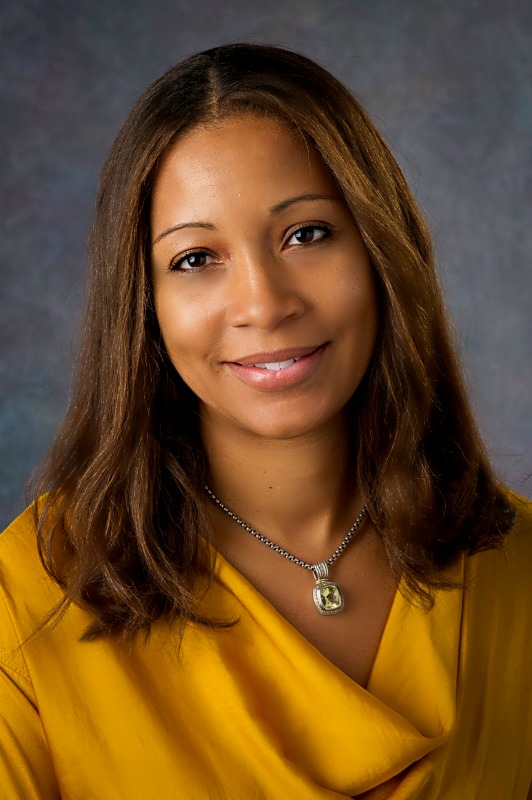
October 124, 2012 / Faculty and Staff Portraits / Photo by Bob Laramie
By Clyde Hughes | AC JosepH Media
CAMDEN – Through years in private practice and now an award-winning law professor at Rutgers University-Camden, Stacy Hawkins said she is clear why she became an attorney and is now shaping the future of incoming law students – to make a difference.
“Thurgood Marshall …(along with Charles Hamilton Houston and the NAACP Legal Defense Fund) was instrumental in cultivating the idea of lawyers as social engineers,” Hawkins said of first black U.S. Supreme Court justice when asked to describe one of her inspirations.
“I believe in the ability of the law to change the world. It’s the reason why I became a lawyer, and it drives me to work hard every day to do my small part to help change the world for the better,” she added.
The Philadelphia native is a professor of law at Rutgers Law School, where she teaches Constitutional law, employment law and an original seminar on diversity and the law.
Hawkins has rich experience in the field. She served as special diversity counsel to the firm Holland & Knight and was the first diversity director for Ballard Spahr during her stint in private practice. A sought-after commentator and frequent writer on the subject, she has counseled and defended employers in employment discrimination and and affirmative action planning, among other cases.
Hard Questions About Diversity
Hawkins said it can be challenging answering all the questions law students have about diversity. Cases and the law surrounding diversity itself is fluid in today’s society.
“I spend an entire semester trying to unpack the idea of diversity and the law, and I can assure you that students STILL don’t get all of their questions answered,” Hawkins told Front Runner New Jersey.com. “Questions like whether diversity is the same or different than equality? What does equality even mean? Who is included in the idea of diversity, or equality, e.g., former slaves, all black persons, all persons of color, women, religious minorities, the poor, persons with disabilities, LGBTQ persons, immigrants (of any race), political minorities, others? How will we know when we have achieved diversity and/or equality? Is that even possible?
“These are hard questions, and there are no easy answers. We wrestle with them mightily, and the best that I can hope for my students is that they understand the complexities inherent in these issues and that they know what the right questions to ask are, even if they are not always sure of the right answers,” she added.
Early Calling to the Law
The hard questions have never deterred Hawkins away from the law. She said she knew early on that she wanted to practice law, but admitted it wasn’t what she originally expected.
“I have known that I wanted to be a lawyer since at least the second grade,” Hawkins said. “Perhaps even before then, but that is around the time I can recall first expressing my interest in ‘being a lawyer’ out loud. That interest was nurtured by both family and teachers who all rightly observed that I was very well-suited to the profession given my, ahem, propensity for arguing. So it stuck.
“Being a lawyer has not been at all what I imagined it would be when I was young, but that is largely because I had no real idea what it meant to be a lawyer before I went to law school. My ideas of what it meant to be a lawyer came from completely disparate sources – reading about legal icons like Thurgood Marshall and Constance Baker Motley in books and watching Hollywood depictions of tv lawyers like Claire Huxtable (Phylicia Rashad’s character on The Cosby Show) and Jonathan Rollins (Blair Underwood’s character on LA Law).
“So I, quite mistakenly, thought that I was going to fight for civil rights (like Marshall and Baker) while making lots of money (like Huxtable and Rollins). Law school was a rude awakening to the harsh reality that civil rights lawyers do a lot of good in the world, but they don’t get rich doing it. Meanwhile, law firm lawyers don’t usually do a lot of good in the world (if by that you mean helping the average person or advancing the rights of people generally), but they do make a good living,” she continued.
Hawkins said through her work in employment law and diversity management, she feels like she has made a positive difference with her craft while making a decent living.
“I may not exactly have been the champion for civil rights that Marshall and Motley were, but I was proud of and loved the work that I did helping to make workplaces more diverse and inclusive while advising employers on how to navigate the law,” Hawkins said. “In the end, I have not had the career that I imagined at all, but I have enjoyed it immensely.”
Hawkins earned her bachelor’s degree from the University of Virginia and her law degree from the Georgetown University Law Center, where she was the national champion of the 1996 Frederick Douglass Moot Court competition.
Coming Home
She said despite the time away from Philadelphia, she always had a desire to return home. Hawkins, who celebrated her 47th birthday this month, has established roots with her husband of 19 years this September and two children (Brandon, 16, and Ella, 11), who she calls her “pride and joy.”
“I attended and graduated from Philadelphia Central High School in 1989,” Hawkins said. “When I started in 1985, I was only the second class of freshman girls admitted to the school. Central refers to its graduates by their class number rather than their class year. I am a proud graduate of the class of 248 (the 248th graduating class).”
After spending part of her legal career in the nation’s capital, Hawkins returned to Philadelphia in 2006 to work at Ballard Spahr, LLP as its first director of diversity.
“After leaving Ballard, and ten years of practicing law, I decided that I wanted to shift the focus of my career from practicing law to influencing the development of law,” Hawkins said. “This led me to pursue a career in the legal academy. Law professors influence the law in two ways: (1) by training future lawyers to be critical legal thinkers capable of shaping the law, and (2) by producing academic scholarship that (hopefully) influences lawyers and judges in their arguments and opinions in future decided cases.
“I had only recently returned to Philadelphia, and I wanted to stay close to my family. So I sought academic jobs at local law schools. I started out at Rutgers Camden as an adjunct professor, teaching employment law (my area of practice). I was fortunate to make the transition to visiting professor after one semester as an adjunct. After two years visiting, I accepted a position on the tenure-track. I was tenured and promoted to full professor last year.
In 2017, Hawkins received the prestigious Derrick A. Bell Award from the Association of American Law Schools (AALS). The award recognized Hawkins for her commitment to diversity issues in scholarship and teaching, and her contributions to the community.
“We at Rutgers Law School are delighted, but not at all surprised, that the AALS is recognizing Professor Hawkins,” then Rutgers Law School co-dean Michael Cahill said at the time. “This honor properly acknowledges the impact of her work, both as a scholar and as an institutional citizen and leader.”
Hawkins touched on numerous other subjects in her interview with Front Runner New Jersey.com, including her work with the Philadelphia Diversity Law Group and the Pennsylvania Bar Association’s Commission on Women.
FRNJ: Can you tell me about your work with the Philadelphia Diversity Law Group and the Pennsylvania Bar Association’s Commission on Women? Why are those important to you?
Stacy Hawkins: The Philadelphia Diversity Law Group (or PDLG as it is commonly known) was started in 2001 by Nolan Atkinson and several other Philadelphia lawyers to help increase the diversity of new attorneys entering the Philadelphia legal market. PDLG’s signature program is a summer clerkship for diverse students who have completed their first year of laws school. Students are offered an opportunity to work in a local law firm or law department for the summer and gain valuable legal experience, personal mentoring, and professional development. PDLG has been incredibly successful in growing the diversity of the Philadelphia legal community. One of the roles that I valued most during my service on the PDLG Board was serving as the editor for a bi-monthly column written by PDLG members and published in the Legal Intelligencer. It was a wonderful platform for sharing and curating ideas for how to improve diversity within the local legal community.
The mission of the Pennsylvania Bar Association’s (PBA) Commission on Women in the Profession (or WIP) is to ensure the full and equal participation of women in the PBA itself, the legal profession, and the justice system as a whole. During my many years of service with WIP, I held several leadership roles, including as co-chair of the WIP Diversity Committee and as the WIP designee to PBA’s Diversity Team. One of my proudest accomplishments during my time with WIP was working closely with the WIP and Diversity Team leadership to get a resolution passed by the Bar Association recommending that the State of Pennsylvania begin collecting racial and ethnic demographic data, in addition to gender data, for all licensed attorneys in the state so that an accurate record could be maintained of the diversity of the attorneys within the state and so that WIP and PBA could track their progress towards the goal of ensuring full and equal participation by not only women but minorities as well within the profession. This resolution successfully passed the PBA House of Delegates and Board of Governors in 2013. This resolution was accepted by the Pennsylvania Supreme Court and finally took effect in 2018. Now in its second year, the demographic data collected pursuant to this resolution will allow the state to track changes in the demographics of the profession over time for purposes of measuring progress towards the goal of eliminating barriers to equality within the legal profession.
FRNJ: Where did your interest in diversity issues and diversity law come from?
Stacy Hawkins: My interest in diversity emerged early in my career when I began practicing employment law at the law firm of Littler Mendelson. One of the services the firm offered to its clients was employment and human resources training. It turned out that I had a knack for training (which no doubt has translated into my knack for teaching), and I was able to do a lot of the firm’s training for a variety of clients. This was in the late 1990’s/early 2000’s right after Texaco and Coca-Cola had both settled multi-million dollar discrimination lawsuits. One of the things that emerged in the wake of those cases was the need for these companies to conduct internal diversity training. Our firm put together a diversity training program, and the first time I delivered it, I knew this was what I wanted to do for the rest of my career. A couple of years after diversity training piqued my interest in diversity management, I left Littler Mendelson to join the corporate diversity counseling group at a different law firm (Holland & Knight) where we specialized in diversity crisis management. Rather than defend discrimination lawsuits, we helped our clients settle these suits, or conducted diversity audits (usually due to some threat of litigation), and then put together a package of programmatic efforts designed to improve the work culture and climate. It was extraordinarily exciting and rewarding work.
However, when I started doing diversity work, the law had not really begun to, or had only just begun to, address the legality of these diversity efforts. The first big case to address diversity was in 2003 when the Supreme Court decided a case about diversity admissions in higher education (Grutter v. Bollinger). The Supreme Court was more receptive to the idea of diversity than many expected it would be. That case caused me to wonder how the law of diversity would continue to develop in the future. I decided that I wanted to be a part of not only studying the development of this new body of law, but also helping to shape the development of the law of diversity. That’s what I hope I am doing with my teaching and scholarship.
FRNJ: How seriously do you take being a role model for other African-Americans, particularly women who are trying to create their own careers? What advice would you give them?
Stacy Hawkins: I take my responsibility as a role model very seriously. I think that everyone needs someone to look up to, to aspire to, and to model their own careers after. If I can be that for a young, black woman (or man), I am humbled by that opportunity and do my best to provide the kind of guidance, encouragement, and assistance that I didn’t always have myself as a young attorney but always desired.
I give the same advice to all young lawyers – find a career in the law that you will love. The reason is that law school is long, hard and expensive. Your career as a lawyer will be equally challenging and often grueling. And not all legal jobs pay a lot of money as I have since learned. If you don’t love it, it will not be worth it. The good news is that law is one of the most versatile degrees. There are so many careers and career trajectories that are available in the law. So I do believe that almost anyone who wants a legal career can find one they will love.
FRNJ: Any other personal inspirations?
Stacy Hawkins: My mother because she taught me all the lessons and instilled in me all the values that have carried me through life successfully, including “you can’t change your outcome, but you can change your outlook†and “you can do anything if you are willing to work hard enough.â€
FRNJ: Where do you see yourself in five years?
Stacy Hawkins: Still teaching, still writing, still training, still serving, still speaking and still trying to influence the development of the law. In short, still working hard every day to do my small part to help change the world for the better.
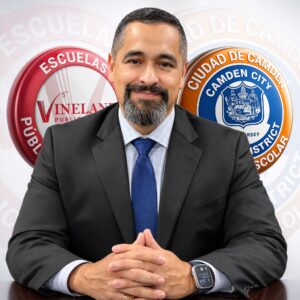
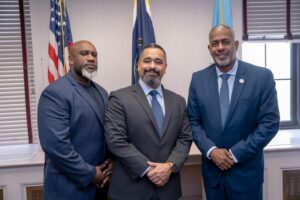

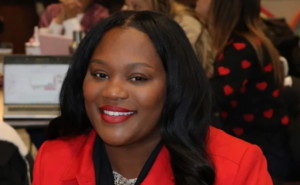



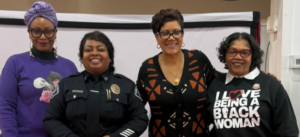
3 thoughts on “Stacy Hawkins Takes On the Tough Questions at Rutgers-Camden Law”